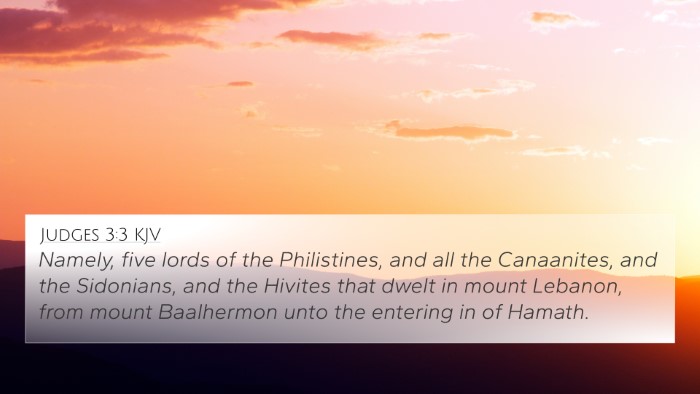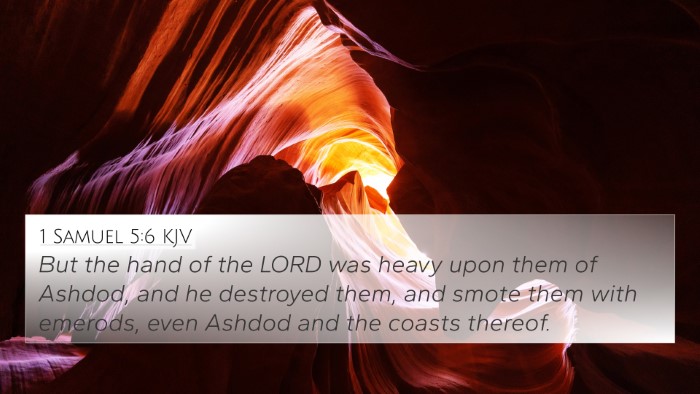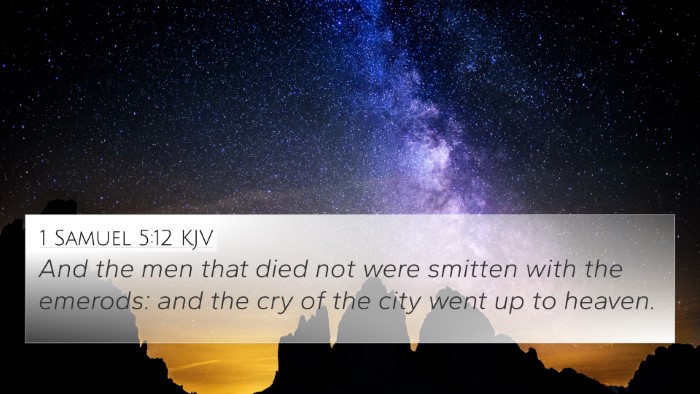Understanding 1 Samuel 6:4
1 Samuel 6:4 reads: "Then the Philistines said, 'What shall be the trespass offering which we shall return to him?' And they said, 'Five golden tumors and five golden mice, according to the number of the lords of the Philistines; for one plague was on you all and on your lords.'" This verse occurs in the context of the Philistines' interactions with the Ark of the Covenant after they captured it.
Contextual Analysis
This verse highlights the Philistines' acknowledgment of their suffering caused by the Ark, which they believed carried plague. The request for a trespass offering reflects their understanding of divine punishment and a desire to appease the God of Israel.
Commentary Insights
-
Matthew Henry:
Henry notes the significance of offerings in relation to sin. The Philistines, though pagans, recognize the necessity of atonement for the affliction they faced due to their disrespect towards the God of Israel. The choice of golden tumors and mice signifies their desire to make a fitting reparation for their misdeeds.
-
Albert Barnes:
Barnes elucidates that the Philistines were driven by fear and reverence towards the Almighty. Their specific offerings were tied to the plagues they suffered, portraying a thematic connection between sin and punishment. This act also illustrates a common practice in ancient cultures of offering gifts to gods as a sign of repentance.
-
Adam Clarke:
Clarke suggests that the gold decorations of their offerings reflected their acknowledgment of the severity of God's judgment. Their choice was not only practical but also symbolic, aiming to display their retrospection and desperation for relief from the plagues.
Cross-Referencing Biblical Texts
This verse connects to several other biblical passages that explore themes of sin, judgment, repentance, and offerings. Below are some pertinent cross-references:
- Exodus 8:17-19: Discusses the plagues inflicted upon Egypt, highlighting a theme of divine punishment.
- Leviticus 5:15-16: This passage outlines trespass offerings, which directly parallels the Philistines' approach in their need for atonement.
- 1 Samuel 6:3: Earlier verses clarify the Philistines' recognition of the Ark's power, setting up the context for this offering.
- 2 Samuel 24:24: David's understanding of sacrificial offerings in appeasing God resonates with the Philistines' attempts.
- Isaiah 53:10: This prophetic verse alludes to suffering and the nature of offerings related to sin and redemption.
- Genesis 20:17: Abraham's intercession for Abimelech reflects a biblical motif of intercession and atonement.
- Proverbs 21:27: This speaks about the futility of wicked sacrifices, adding depth to the understanding of sincere offerings.
- Matthew 5:23-24: The New Testament teaching on reconciliation before giving offerings ties back to the themes in 1 Samuel.
- Revelation 16:10-11: Discusses the consequences of sin, drawing a line to the Philistines’ acknowledgment of their transgressions.
- Psalms 51:17: Elaborates on the importance of a contrite heart in offerings, a principle that the Philistines may have lacked yet aspired to.
Thematic Connections and Biblical Ties
The narrative surrounding 1 Samuel 6:4 fosters a connection between the Old and New Testaments. The Philistines' offerings symbolize a foretaste of the necessity of true repentance that is later expounded in the teachings of Jesus.
Tools for Further Study
For those interested in deeper studies on this verse and its cross-references, consider utilizing the following tools:
- Bible Concordance: A valuable resource for finding keywords and related verses.
- Bible Cross-Reference Guide: Essential for navigating thematic connections across scriptures.
- Cross-Reference Bible Study: Methods that allow the exploration of relationships between different verses.
- Bible Chain References: Linking verses together to uncover comprehensive biblical themes.
Conclusion
1 Samuel 6:4 serves as a profound reminder of the necessity of acknowledging sin and seeking atonement. By examining the contributions from various commentaries and cross-references, one can see the intricate web of connections between scriptures that continually point to the need for repentance and reconciliation with God.










